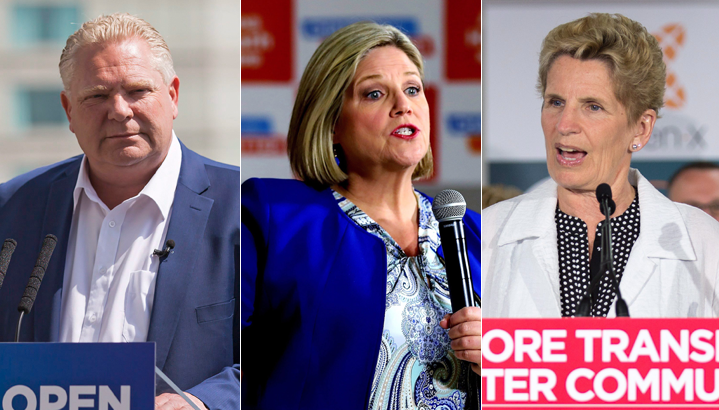TORONTO – The third and final televised debate ahead of Ontario’s June 7th election will offer voters on Sunday one last chance to size up the three main party leaders side by side as they vie to lead the province for the next four years.

With polls suggesting a degree of volatility in the race, a strong debate performance could prove the deciding factor for many voters yet to make up their minds on where their support will go – particularly given the recently resurgent NDP under Andrea Horwath, who has long failed to move her party beyond third-party status.
“Here is a chance for someone who wasn’t a front-runner, is now a front-runner, and people are going to start making assessments about fitness for the premiership that have not been made about Andrea Horwath in the past,” said Tamara Small, an associate professor of political science at the University of Guelph. “We’re just going to be paying way more attention to her.”
Incumbent Kathleen Wynne, who has acknowledged her poll-trailing Liberals have a monumental task in winning re-election, said her goal will be to try to impress on viewers that her party has the best plan for improving their lives and that she can be trusted to follow through.
Wynne said she hoped to make clear to voters that they have an alternative to making Progressive Conservatives Leader Doug Ford the new premier while fending off Horwath.

Get breaking National news
“The message that I am bringing…into this debate is exactly the same as it was on Day 1: I said I was going to build this province up,” Wynne said. “We’ve been doing that and we can continue to do that. We know how to do it, we’ve got the plan that will allow us to do it, it’s practical and it’s realistic.”
A Leger poll published this week suggested Wynne trailing far behind Horwath and Ford, who were essentially tied in voter support. The same poll also indicated that more than one-third of voters had yet to decide, but most indicated their second choice was Horwath and her New Democrats. One subsequent poll put her in top spot.
Given the shift, Small said she expected both Ford and Wynne now to focus on Horwath, making the debate feel different from the two previous ones.
“It’s a big debate,” Small said. “There’s going to be this shift in strategic attention.”
For her part, Horwath said she didn’t know what the other candidates might have in store but said she wanted to instill in viewers a sense of optimism given their concerns about the economy and quality of care for an aging population.
“I hear it all the time: People are worried about the future,” Horwath said. “I’m just going to stay focused on showing Ontarians it doesn’t have to be this way.”
Ford had no comment but a spokeswoman, Melissa Lantsman, said Horwath will have a lot to answer for, both platform-wise and in terms of some of her candidates who have in the past expressed controversial views.
“Mr. Ford is looking forward to talking about his plan for the people,” Lantsman said. “But it’s time for Andrea Horwath to answer the tough questions about her plans to raise taxes, her plan to increase hydro rates, and the anti-Semitic, 9/11 truther, anti-mining candidates she continues to defend,”
One party leader viewers won’t get to assess is the Greens’ Mike Schreiner, who has been shut out of the debate on the grounds his party has had no seats in the legislature.
In a protest letter to the broadcast consortium in charge of the debate, Schreiner said more than 25,000 voters had signed petitions calling for his inclusion – a position he said both Horwath and Wynne supported.
“Televised leaders debates are an important part of our democracy and have far-reaching implications for the outcome of elections,” Schreiner said. “By silencing our voice, you are denying Ontarians the right to hear a viable vision for Ontario that their tax dollars are supporting. This is a disservice to democracy.”
The debate, to be moderated by TVO’s Steve Paikin and Farah Nasser of Global News, is scheduled to be broadcast at 6:30 p.m Sunday from the CBC’s Toronto headquarters.







Comments
Want to discuss? Please read our Commenting Policy first.